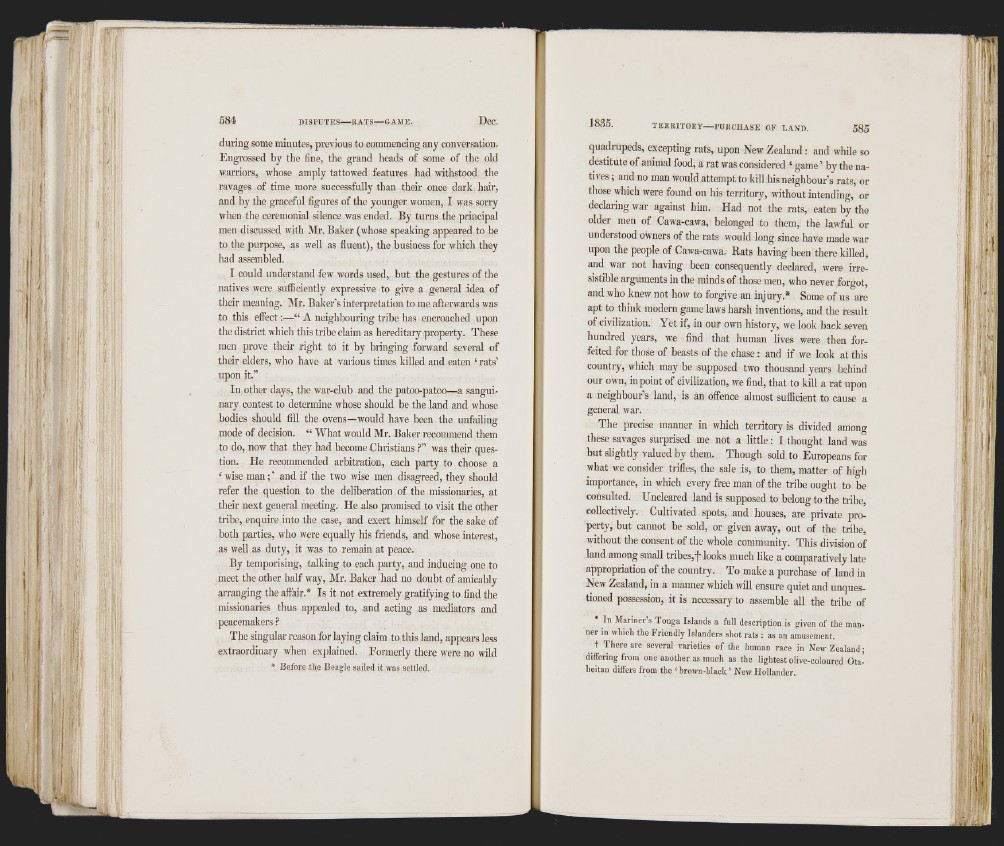
584 DISPUTES RATS GAME.
I ;
i
7 (I !
during some minutes, previous to commencing any conversation.
Engrossed by the fine, the grand heads of some of the old
■warriors, whose amply tattowed features had withstood the
ravages of time more successfully' than their once dark hair,
and by the graceful figures of the younger women, I was sorry
when the ceremonial silence was ended. By turns the principal
men discussed with Mr. Baker (whose speaking appeared to be
to the purpose, as well as fluent), the business for which they
had assembled.
I could understand few words used, but the gestures of the
natives were sufficiently expressive to give a general idea of
their meaning. Mr. Baker’s interpretation to me afterwards was
to this effect;—“ A neighbouring tribe has encroached upon
the district which this tribe claim as hereditary property. These
men prove their right to it by bringing forward several of
their elders, who have at various times killed and eaten ‘ rats’
upon it.”
In other days, the war-club and the patoo-patoo—a sanguinary
contest to determine whose should be the land and whose
bodies should fill the ovens—would have been the unfailing-
mode of decision. “ What would Mr. Baker recommend them
to do, now that they had become Christians was their question.
He recommended arbitration, each party to choose a
‘ wise man; ’ and if the two wise men disagreed, they should
refer the question to the deliberation of the missionaries, at
their next general meeting. He also promised to visit the other
trihe, enquire into the case, and exert himself for the sake of
both parties, who were equally his friends, and whose interest,
as well as duty, it was to remain at peace.
By temporising, talking to each party, and inducing one to
meet the other half way, Mr. Baker had no doubt of amicably
arranging the affair.* Is it not extremely gratifying to find the
missionaries thus appealed to, and acting as mediators and
peacemakers ?
The singular reason for laying claim to this land, appears less
extraordinary when explained. Formerly there were no wild
• Before .the Beagle siiiled it was settled.
quadrupeds, excepting rats, upon New Zealand : and while so
destitute of animal food, a rat was considered ‘ game ’ by the natives
; and no man would attempt to kill his neighbour’s rats, or
those which were found on his territory, without intending, or
declaring war against him. Had not the rats, eaten by the
older men of Cawa-cawa, belonged to them, the lawful or
understood owners of the rats would long since have made war
upon the people of Cawa-cawa. Rats having been there killed,
and war not having been consequently declared, were irresistible
arguments in the minds of those men, who never forgot,
and who knew not how to forgive an injury.* Some of us are
apt to think modern game laws harsh inventions, and the result
of civilization. Yet if, in our own history, we look back seven
hundred years, we find that human lives were then forfeited
for those of beasts of the chase : and if we look at this
country, which may be supposed two thousand years behind
our own, in point of civilization, we find, that to kill a rat upon
a neighbour’s land, is an offence almost sufficient to cause a
general war.
The precise manner in which territory is divided among
these savages surprised me not a little: I thought land was
but slightly valued by them. Though sold to Europeans for
what we consider trifles, the sale is, to them, matter of high
importance, in which every free man of the tribe ought to be
consulted. Uncleared land is supposed to belong to the tribe,
collectively. Cultivated spots, and houses, are private property,
but cannot be sold, or given away, out of the tribe,
ivithout the consent of the whole community. This division of
land among small tribes,# looks much like a comparatively late
appropriation of the country. To make a purchase of land in
New Zealand, in a manner which will ensure quiet and unquestioned
possession, it is necessary to assemble all the tribe of
• In Mariner’s Tonga Islands a full description is given of the manner
in which the Friendly Islanders shot rats : as an amusement.
+ There are several varieties of the human race in New Zealand;
differing from one another as much as the lightest olive-coloured Ota’-
lieitan differs from the ‘ brown-black ’ New Hollander.
;v,.
li-
!|
! '
I ;